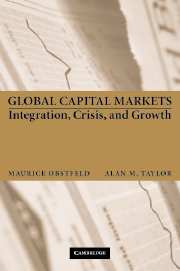Book contents
8 - Uneven Rewards and Risks
Published online by Cambridge University Press: 03 February 2010
Summary
As we noted in the introductory part of the book, open capital markets allow countries to exploit the opportunities for risk-sharing and intertemporal smoothing that would be closed off under autarky. Yet we also noted that open markets impose additional constraints (including the trilemma) on the feasible choice sets of national policymakers. To the extent that these constraints discourage bad policy choices, they impose useful discipline on national authorities. But effective discipline must rely on a credible threat of punishment. Critics of financial globalization argue that market punishments often come too late to discipline policies effectively, that the incidence of punishment is capricious, and that in many cases the punishment – in the form of crisis-induced unemployment, forgone growth, and social instability – is excessive. The potential benefits of capital-market integration therefore have to be weighed against the potential costs, with due regard for the possibility that the benefit-cost calculus differs between countries at different stages of economic development.
Of course, if all governments and policymakers consciously restricted their actions to lie within the feasible set, the turbulence in international capital markets would be much reduced. And if all markets were perfect, complete, and efficient, then current global economic affairs would be less fractious – and financial history so much duller. In a distortion-free world of optimizing agents and policymakers, there would be no need to describe the trilemma, no policy debates about globalization, no trouble for governments to get into, and no International Monetary Fund (IMF) or other agencies required to manage disasters. In particular, in an ideal world, there would be no crises.
- Type
- Chapter
- Information
- Global Capital MarketsIntegration, Crisis, and Growth, pp. 259 - 300Publisher: Cambridge University PressPrint publication year: 2004



